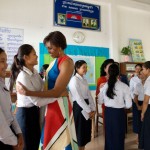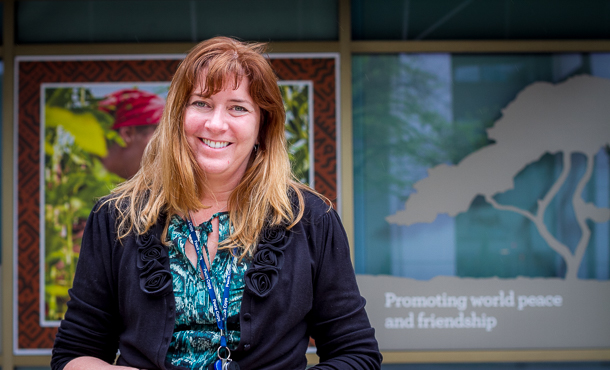Last week, first lady Michelle Obama, with her daughters and mother, visited London to announce a new partnership between the US and British governments to support girls’ education and empowerment.
That’s not the only partnership the White House has lately touted. In early March, the president and first lady launched “Let Girls Learn,” an initiative that taps the Peace Corps to focus on girls’ education and empowerment. Heading that program is Center for Justice and Peacebuilding alumna Krista Rigalo, a veteran administrator of training and education programs in the Peace Corps. She assumed her duties May 18.
“This is an exciting opportunity for us,” Rigalo said. “While the Peace Corps has been involved in supporting and encouraging girls since we first sent volunteers overseas in 1961, we see this as an opportunity to be more intentional about our present-day efforts. We know that investing in girls, a moral imperative in and of itself, is a proven catalyst for development.”
Girls who complete secondary education marry later, delay childbirth, have better spacing between their children, are more likely to educate their children and often see up to a 20% increase in earnings over their lifetimes, continued Rigalo. “And yet, 62 million girls are currently not in school.”

She said that Peace Corps volunteers are uniquely placed to work with girls and communities to address barriers to girls’ education. In much of the world, the barriers are numerous and include lack of educational opportunities, lack of funds for school fees, lack of sanitary hygiene products during menstruation, lack of girls’ latrines and lack of local schools.
In the first year, the program will target the following countries: Albania, Benin, Burkina Faso, Georgia, Cambodia, Uganda, Ghana, Moldova, Mongolia, Mozambique, Thailand and Togo.
Rigalo has long been involved with the Peace Corps, first as a volunteer in the late 1980s and early 1990s, then later as country desk officer, program and training specialist and chief of programming and training for the Africa region.
Following service as a Mennonite Central Committee (MCC) volunteer in the eastern Congo, Rigalo came to Eastern Mennonite University to pursue an MA in conflict transformation. She graduated in 2000 and returned to Africa with MCC to work at the Africa Peacebuilding Institute in Zambia. She also worked for MCC in Angola.
In 2003, Rigalo entered the doctoral program in conflict analysis and resolution at George Mason University. She began working on the Peace Corps staff in 2005.
Under Rigalo, the Peace Corps will recruit and train additional volunteers to focus specifically on girls’ access to education while volunteers already in the field can apply for funds through a newly established girls’ education fund.
Let Girls Learn will empower “local leaders to put lasting solutions in place,” says the website. “Peace Corps volunteers who live and work at the grassroots level will serve as catalysts of community-led change.”
“Right now, more that 62 million girls around the world are out of school – a heartbreaking injustice that deprives these girls of the chance to develop their potential,” wrote First Lady Michelle Obama in a June 15 Financial Times article. “Girls’ education is a global issue that requires a global solution … because every girl, no matter where she lives, deserves the opportunity to develop the promise inside her.”
